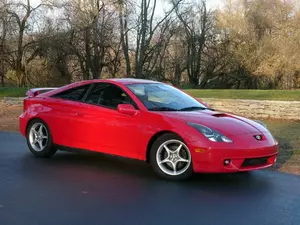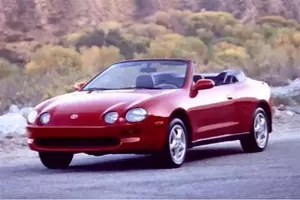
| Vehicle | Precise engine size | Difference from world average | Engine size to consumption ratio | Horsepower from 1 L | Engine size to 100 kg of weight |
|---|---|---|---|---|---|
| 1.8 VT-i 16V |
1.79 L (1794 cc) |
23.5% smaller | 58 cc to 1 mpg | 80 hp from 1 L | 163 cc to 100 kg |
| 1.8 VVTL-I T-Sport |
1.8 L (1796 cc) |
23.4% smaller | 64 cc to 1 mpg | 107 hp from 1 L | 150 cc to 100 kg |
| 1.8 i GT- R |
1.8 L (1796 cc) |
23.4% smaller | - | 101 hp from 1 L | 150 cc to 100 kg |
| Vehicle | 1.8 VT-i 16V |
|---|---|
| Precise engine size | 1.79 L (1794 cc) |
| Difference from world average | 23.5 smaller |
| Engine size to consumption ratio | 58 cc to 1 mpg |
| Horsepower from 1 L | 80 hp from 1 L |
| Engine size to 100 kg of weight | 163 cc to 100 kg |
| Vehicle | 1.8 VVTL-I T-Sport |
| Precise engine size | 1.8 L (1796 cc) |
| Difference from world average | 23.4 smaller |
| Engine size to consumption ratio | 64 cc to 1 mpg |
| Horsepower from 1 L | 107 hp from 1 L |
| Engine size to 100 kg of weight | 150 cc to 100 kg |
| Vehicle | 1.8 i GT- R |
| Precise engine size | 1.8 L (1796 cc) |
| Difference from world average | 23.4 smaller |
| Engine size to consumption ratio | - |
| Horsepower from 1 L | 101 hp from 1 L |
| Engine size to 100 kg of weight | 150 cc to 100 kg |

| Vehicle | Precise engine size | Difference from world average | Engine size to consumption ratio | Horsepower from 1 L | Engine size to 100 kg of weight |
|---|---|---|---|---|---|
| 2.2i GT |
2.17 L (2166 cc) |
7.7% smaller | 87 cc to 1 mpg | 63 hp from 1 L | 181 cc to 100 kg |
| Vehicle | 2.2i GT |
|---|---|
| Precise engine size | 2.17 L (2166 cc) |
| Difference from world average | 7.7 smaller |
| Engine size to consumption ratio | 87 cc to 1 mpg |
| Horsepower from 1 L | 63 hp from 1 L |
| Engine size to 100 kg of weight | 181 cc to 100 kg |

| Vehicle | Precise engine size | Difference from world average | Engine size to consumption ratio | Horsepower from 1 L | Engine size to 100 kg of weight |
|---|---|---|---|---|---|
| 1.8 i 16V |
1.76 L (1762 cc) |
24.9% smaller | 55 cc to 1 mpg | 66 hp from 1 L | 147 cc to 100 kg |
| 2.0 Turbo 4WD |
2 L (1998 cc) |
14.8% smaller | 80 cc to 1 mpg | 121 hp from 1 L | 143 cc to 100 kg |
| 2.0 i 16V |
2 L (1998 cc) |
14.8% smaller | 69 cc to 1 mpg | 88 hp from 1 L | 154 cc to 100 kg |
| Vehicle | 1.8 i 16V |
|---|---|
| Precise engine size | 1.76 L (1762 cc) |
| Difference from world average | 24.9 smaller |
| Engine size to consumption ratio | 55 cc to 1 mpg |
| Horsepower from 1 L | 66 hp from 1 L |
| Engine size to 100 kg of weight | 147 cc to 100 kg |
| Vehicle | 2.0 Turbo 4WD |
| Precise engine size | 2 L (1998 cc) |
| Difference from world average | 14.8 smaller |
| Engine size to consumption ratio | 80 cc to 1 mpg |
| Horsepower from 1 L | 121 hp from 1 L |
| Engine size to 100 kg of weight | 143 cc to 100 kg |
| Vehicle | 2.0 i 16V |
| Precise engine size | 2 L (1998 cc) |
| Difference from world average | 14.8 smaller |
| Engine size to consumption ratio | 69 cc to 1 mpg |
| Horsepower from 1 L | 88 hp from 1 L |
| Engine size to 100 kg of weight | 154 cc to 100 kg |

| Vehicle | Precise engine size | Difference from world average | Engine size to consumption ratio | Horsepower from 1 L | Engine size to 100 kg of weight |
|---|---|---|---|---|---|
| 1.8i 16V |
1.76 L (1762 cc) |
24.9% smaller | - | 65 hp from 1 L | 147 cc to 100 kg |
| 1.6 STi |
1.59 L (1587 cc) |
32.4% smaller | 47 cc to 1 mpg | 66 hp from 1 L | 132 cc to 100 kg |
| 2.0i 16V |
2 L (1998 cc) |
14.8% smaller | - | 70 hp from 1 L | 167 cc to 100 kg |
| 2.0 i 16V |
2 L (1998 cc) |
14.8% smaller | 64 cc to 1 mpg | 78 hp from 1 L | 167 cc to 100 kg |
| 2.0 i 16V Turbo 4WD |
2 L (1998 cc) |
14.8% smaller | 80 cc to 1 mpg | 104 hp from 1 L | 143 cc to 100 kg |
| Vehicle | 1.8i 16V |
|---|---|
| Precise engine size | 1.76 L (1762 cc) |
| Difference from world average | 24.9 smaller |
| Engine size to consumption ratio | - |
| Horsepower from 1 L | 65 hp from 1 L |
| Engine size to 100 kg of weight | 147 cc to 100 kg |
| Vehicle | 1.6 STi |
| Precise engine size | 1.59 L (1587 cc) |
| Difference from world average | 32.4 smaller |
| Engine size to consumption ratio | 47 cc to 1 mpg |
| Horsepower from 1 L | 66 hp from 1 L |
| Engine size to 100 kg of weight | 132 cc to 100 kg |
| Vehicle | 2.0i 16V |
| Precise engine size | 2 L (1998 cc) |
| Difference from world average | 14.8 smaller |
| Engine size to consumption ratio | - |
| Horsepower from 1 L | 70 hp from 1 L |
| Engine size to 100 kg of weight | 167 cc to 100 kg |
| Vehicle | 2.0 i 16V |
| Precise engine size | 2 L (1998 cc) |
| Difference from world average | 14.8 smaller |
| Engine size to consumption ratio | 64 cc to 1 mpg |
| Horsepower from 1 L | 78 hp from 1 L |
| Engine size to 100 kg of weight | 167 cc to 100 kg |
| Vehicle | 2.0 i 16V Turbo 4WD |
| Precise engine size | 2 L (1998 cc) |
| Difference from world average | 14.8 smaller |
| Engine size to consumption ratio | 80 cc to 1 mpg |
| Horsepower from 1 L | 104 hp from 1 L |
| Engine size to 100 kg of weight | 143 cc to 100 kg |